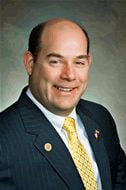The Republican state senators were unclear about the reasons for the a bill they were about to vote on, but that didn’t stop them from supporting it.
They acknowledged the reason was plainly political — they couldn’t afford to cross the sponsor, Speaker of the House David Gowan.
“I want to explain my vote, such as it is,” Senate appropriations committee chairman Don Shooter, of Yuma, said at the March 22 hearing. “It’s the speaker’s bill. And with that I vote aye.”
Sen. Sylvia Allen, a Snowflake Republican, explained she was voting for it “because it’s the speaker’s bill, and I’m going to show respect for him.”
For that, Sen. Olivia Cajero-Bedford, a Democrat from Tucson, chastised Allen: “You wouldn’t have anything to lose. Your bills already passed. You should have voted no.”
Another legislative session has brought another curiously intense effort by Gowan, the Sierra Vista Republican, to change state laws regulating pawnshops. Other legislators are so far receptive, though neither bill has passed the full Senate.
This year’s bills make changes similar to what Gowan was trying to do last year as the clock ticked down on the end of the session. One of this year’s bills, HB 2566, would make it illegal for cities and counties to impose a fee on pawnshop transactions. They impose a fee now in order to fund stolen-property investigations.
Another bill, HB 2690, would put the Arizona Department of Public Safety in charge of licensing pawnbrokers, receiving daily transaction reports and inspecting pawnbrokers’ receipts and goods. This is the bill the Senate committee was debating March 22.
Last year, legislators reported Gowan’s people were twisting arms on the last days of the session, asking for their support for his pawnbroker bill in exchange for moving their bills.
It didn’t work: Sen. President Andy Biggs shockingly closed the Senate’s session before the House was done with its business. The pawnbroker bill didn’t pass.
But that didn’t mean the idea had died, at least as long as Gowan is speaker. He is the sole sponsor of both bills, which were inspired in part by Tucsonan Roger Score, known around here for his involvement in city alarm-company ordinances.
Score, a former alarm-company owner who has lobbied for that industry in the past, told me pawnshop fees unfairly target businesses that are not major sources of stolen property. They’re also a form of double taxation, he said, because the buyers, sellers and pawnshop owners already pay taxes for police services.
Swap meets, Ebay and Craigslist are more likely sources of stolen goods than pawnshops these days, he pointed out. Explaining his involvement in pushing the bill, Score said, “I have nothing to do with that business at all. It’s just a nasty regressive tax.”
“You’re charging people for a crime they didn’t commit.”
Gowan testified briefly in support of the bills on Feb. 17 and couldn’t give detailed answers to questions. His presence as house speaker seemed to be the main argument needed.
“This is a pretty simple bill,” he said. “What we’re trying to do is take it from the sheriffs and local areas and take it up to statewide. It’ll just be one area of regulation instead of 15 different regions.
“Consolidating this up, giving one level of regulation across the state is a better way to go, absolutely,” he said.
DPS officials have not weighed in on the bill, probably a sign that they don’t like it. Cities and counties oppose it strongly, arguing their agencies are closer to the shops and the communities they operate in than the state agency that runs the highway patrol.
Tucson charges pawnbrokers $1 per transaction or $1,000 per year, money that goes to the city and is funneled to the police department and to cover the cost of participating in Leads Online, an investigative system, the city’s legislative liaison Andrew Greenhill told me. The city took in $369,000 from that fee last year, he said.
No one showed up at the Senate appropriations committee to speak in support of the changes to pawnshop law, but that didn’t matter and HB 2690 passed out of committee. The vote was not unanimous, though, which you can chalk up to Democratic legislators having nothing left to lose.
“I’m going to be voting no,” Cajero-Bedford said. “Since this is the third time I’ve voted against speaker Gowan’s bills, it’s no wonder my bills never got heard over in the House, (bills) that passed handily here in the Senate.”
World View deal challenged
The Goldwater Institute sent a letter to Pima County this week warning it plans to challenge the county’s deal with World View Enterprises in court. You may recall, this is the deal under which Pima County plans to build a headquarters building for near-space balloon company World View and a county-owned spaceport, and World View will pay the county back over 20 years.
The county’s costs, with interest, are expected to be about $20 million, which World View is obligated to more than pay back over the term of the deal. Goldwater says nevertheless, the contract violates the Arizona constitution’s gift clause. That clause forbids Arizona’s governments from giving or loaning their credit to any individual, association or corporation.
Goldwater’s attorneys have filed lots of gift-clause lawsuits over recent years, and they certainly know the law better than most of us laymen do. But of course, Pima County considered the possibility a challenge before striking the deal.
“County staff took great care to comply with all state laws in its negotiation of the economic incentive agreement with World View,” Administrator Chuck Huckelberry said in a statement.
I suspect the county is more likely to run into problems with its private negotiation of construction and other contracts for the World View and spaceport deal than with the gift clause. My biggest beef with the deal remains the short time frame in which the deal was presented to the supervisors for passage, with certain key details secret.
Miller gets GOP challenge
Republican Ally Miller was the chief opponent of the World View deal — calling it a violation of the gift clause, in fact — and now she has a primary challenger.
John Winchester, who works as outreach coordinator for the UA’s Center for Judaic Studies, filed as a candidate on Wednesday. Winchester, 32, is a political novice but said he wants to get things done in a way Miller hasn’t been able to.
“The goal of my campaign is not to attack her personality but to attack her methodology,” Winchester said. “She has a very toxic relationship at the county.”
Winchester said he hopes to win by taking Oro Valley and the Catalina Foothills in what he insists is a more moderate district than Miller’s 2012 victory suggests.






